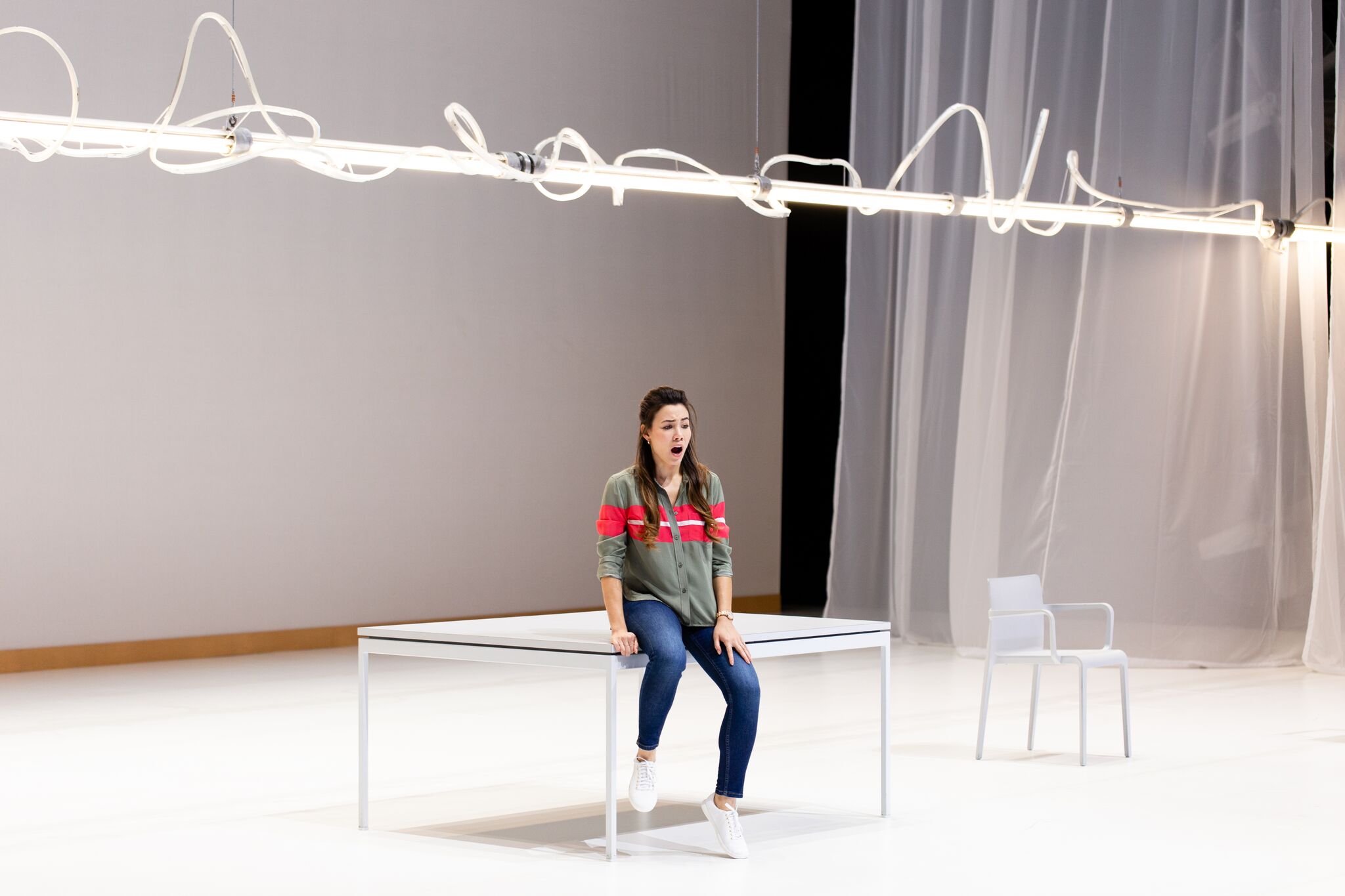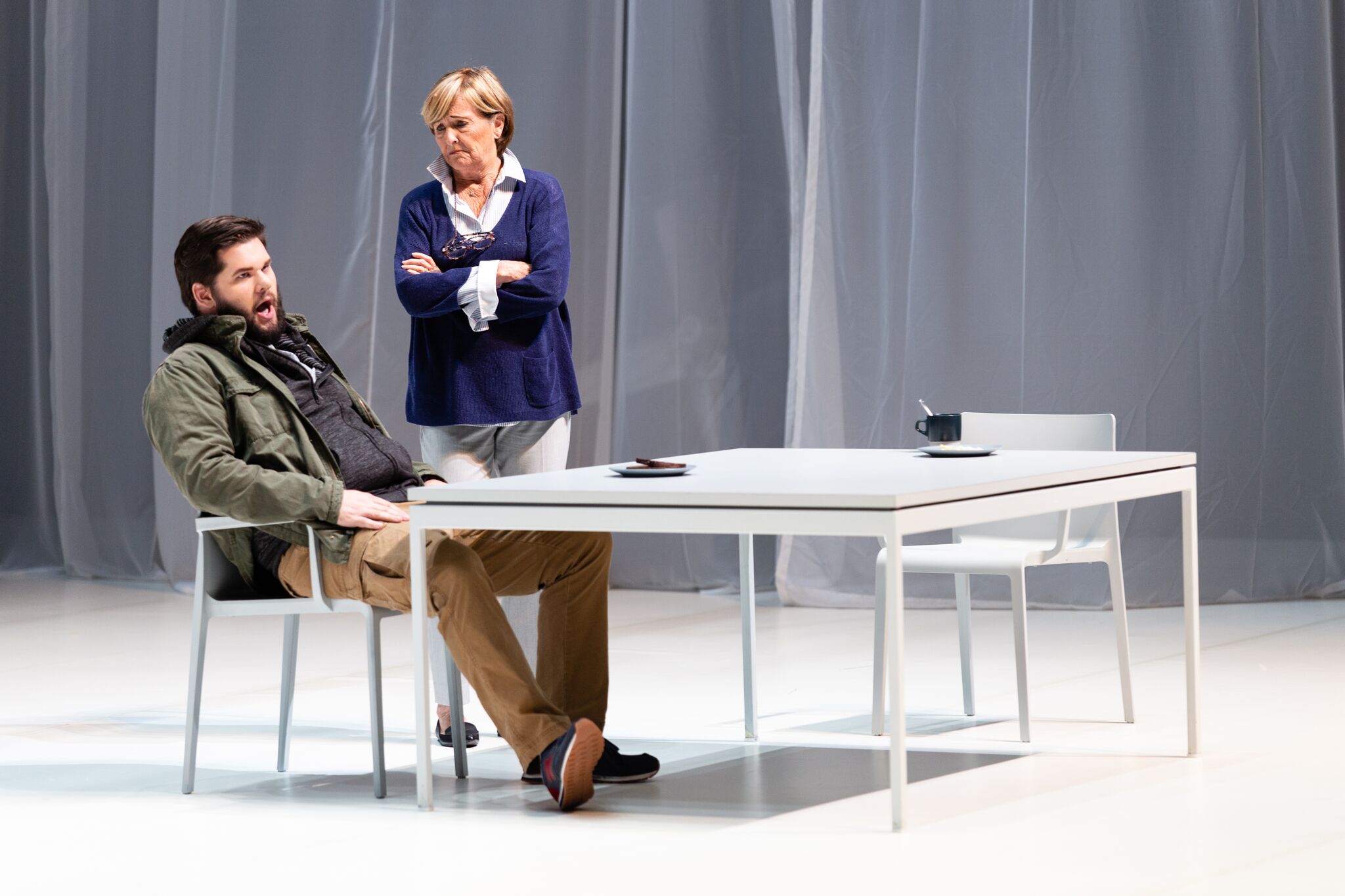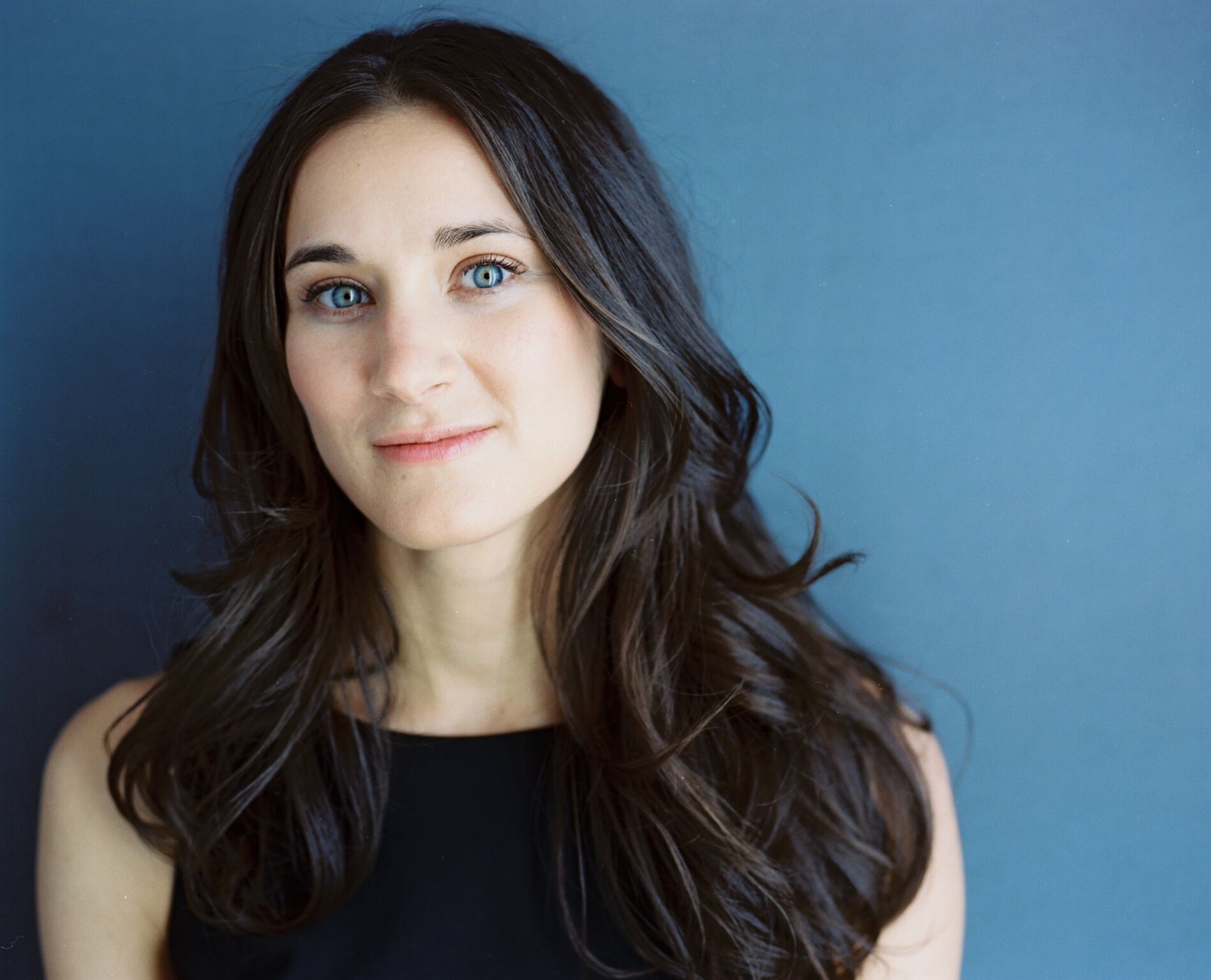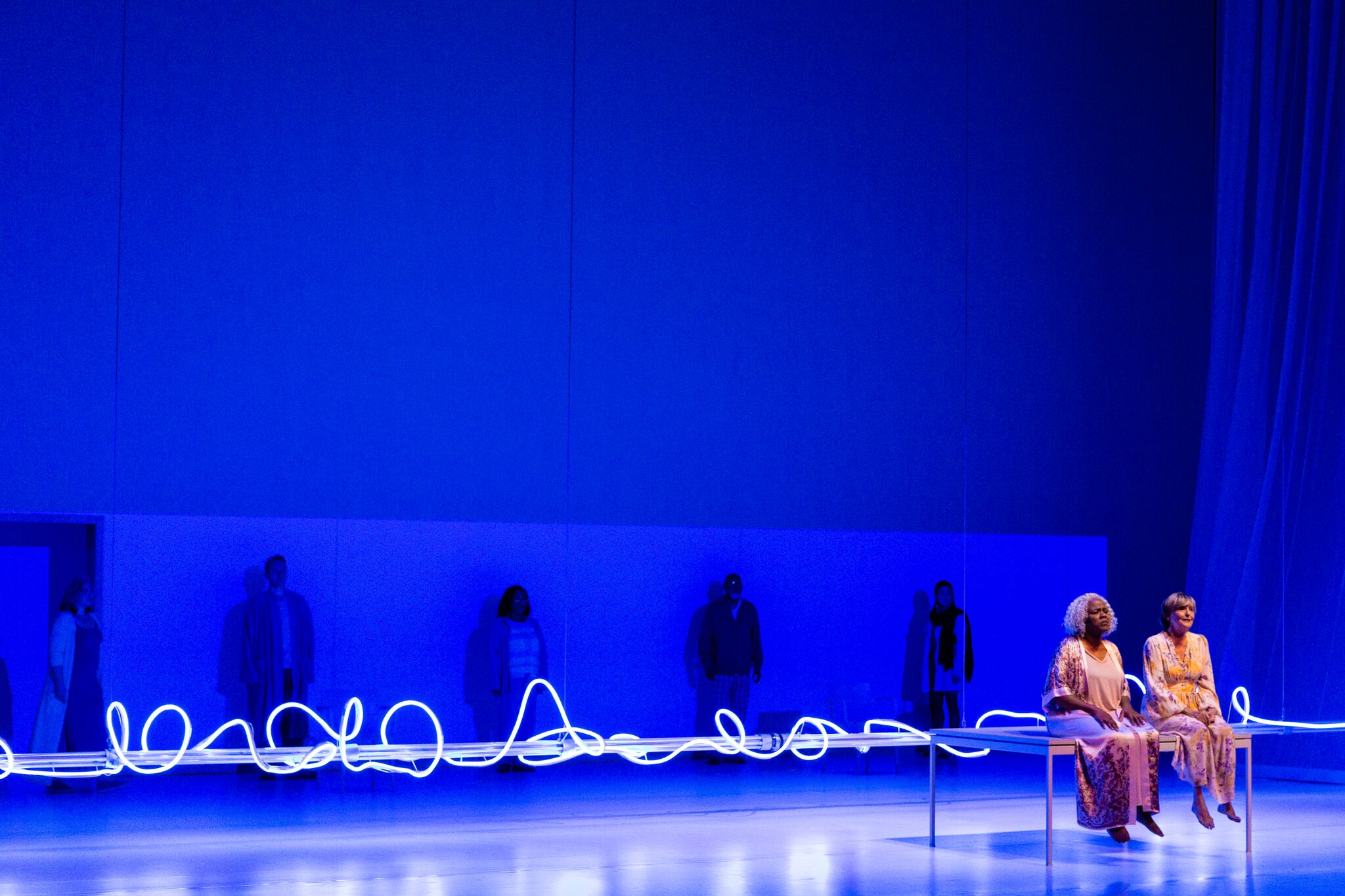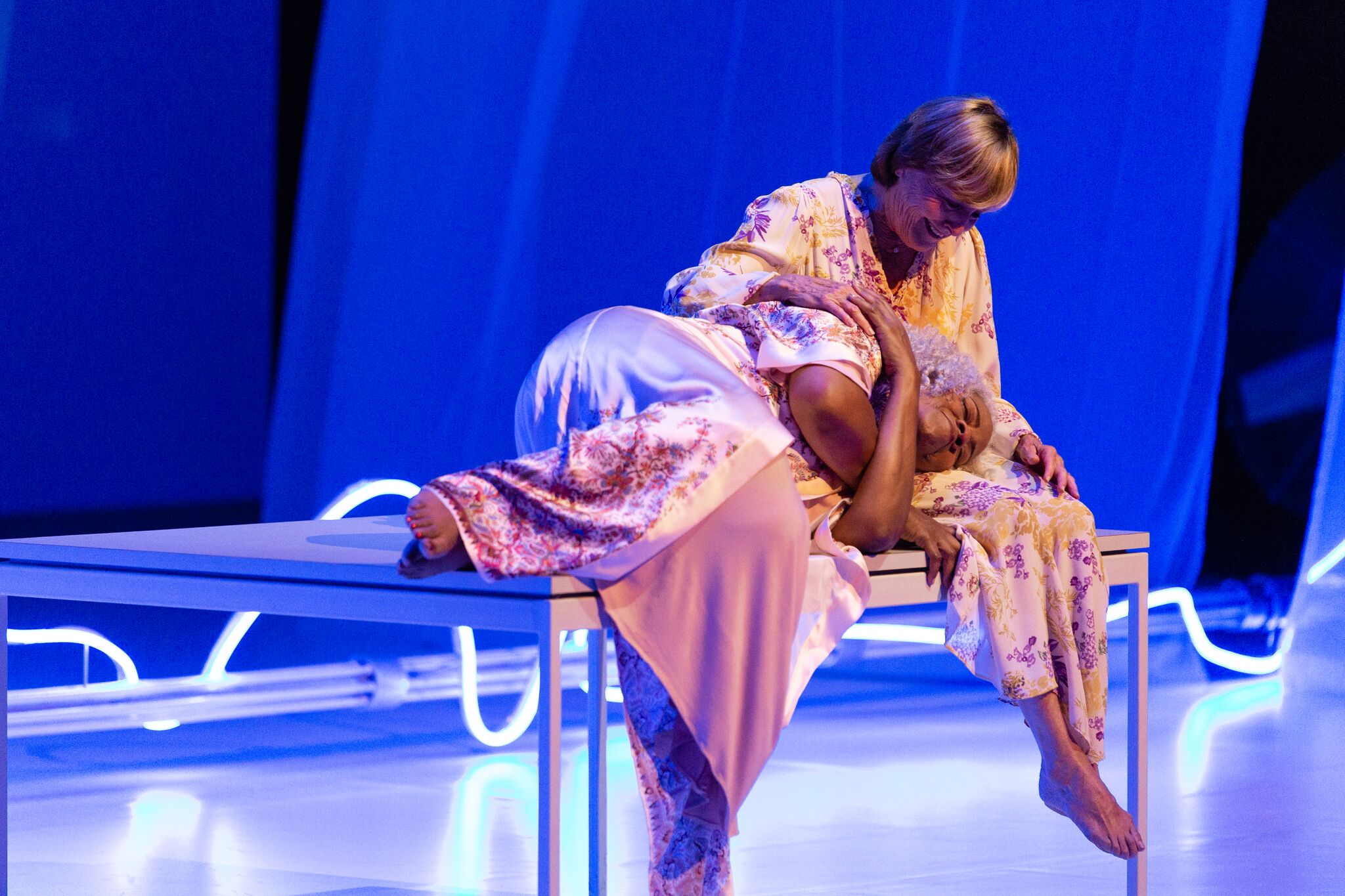Opera Philadelphia opened the O18 Festival with the premiere of Sky on Swings, an opera that presents Alzheimer’s disease in full frontal nudity. O18 is purposed with exploring boundaries for opera, pioneering new directions. The reins for this new production addressing a contemporary issue were handed to Lembit Beecher, based on his concept originated while he was OP’s first composer in residence, and to librettist Hannah Moscovitch, a leading Canadian playwright; they also collaborated on O17’s I Have No Stories to Tell You. In the 74 minutes of Swings, they offer no silver linings or happy endings, nor do they plead for a cause, but they do offer compassion. As the character Danny says as she voluntarily enters a facility to provide for her care as an Alzheimer’s patient, this is where she will lose her mind including herself, and then die, a comment bleak, but human in that the exact line as delivered appropriately drew a laugh.
Martha (Marietta Simpson) comforts Danny (Frederica von Stade) when she enters the Alzheimer’s care facility. Photo by Dominic M. Mercier; courtesy of Opera Philadelphia.
The topic hits close to home for many people today. Frankly, I don’t want to think about Alzheimer’s disease. But every time I forget something, the name of someone I know that I can’t make surface or what it was that I went down to the basement for, I think about getting older and memory loss, and I wonder. I wonder if it is getting worse. I think there are a lot of us who are wondering. Those in the audience who have friends and family members with this disease must have found watching this opera especially painful and perhaps provocative. My wife who lost her father to AD had tears in her eyes, not just from sympathy for the story being presented, but also from the connection it made to her own life.
At this point, you might say no thanks. The problem is this: if you don’t go to see Sky on Swings you will miss a lot. You will miss an excellent work of art doing its job, in this case forcing us to confront one of today’s worst fears, enabling us to see it for what it is and what it isn’t, and maybe to some degree bring us together in facing it. You will miss the understanding and insight this production offers, as it shows us not just the medical, but the human face of Alzheimer’s disease.
Sharleen Joynt alone as Winnie; Daniel Taylor as Ira forces his mom, Danny played by Frederica von Stade to confront her memory loss. Photos by Dominic M. Mercier; courtesy of Opera Philadelphia.
You will also miss two famous mezzo-sopranos turning in outstanding acting as well as singing performances. Marietta Simpson plays Martha, a woman in her seventies with advanced disease, who is visited often by her daughter, Winnie, played by soprano Sharleen Joynt. Frederica von Stade plays Danny, a researcher in her sixties forced to confront her failing memory by her son, Ira, played by tenor Daniel Taylor. Martha and Danny meet in the facility and develop an emotional connection. Martha has hallucinations and is often fearful without knowing why, but she is calmed by Danny’s presence. She recalls a memory of a girl she had fallen in love with when she was fifteen and begins to place Danny in that role; Danny slowly succumbs to her fantasy. We see these two, even in what we call an impaired state, as human, capable of emotional bonding. Ms. Stade and Ms. Simpson are fine actors with very appealing stage presence. Their natural likability easily elicits sympathy for their distress. I thought the pairing was perfect; if they were to become co-stars in a television series, it would be a hit. It takes talent and maturity to deliver those lyrics, sometimes mumbled, as recitative or as arias with such clarity and precision and believability. The younger members of the cast, Ms. Joynt and Mr. Taylor also sang and played their roles well and seem to have bright careers ahead of them. The use of elders, inmates at the memory center facility provided continuous motion and background vocalizations helping to set the stage and mood.
l to r: Composer Lembit Beecher (photo by Jamie Jung); Librettist Hannah Moscovitch (photo by Ian Brown); Director Joanna Settle (photo courtesy of Joanna Settle. Photos courtesy of Opera Philadelphia.
You will also miss a high-quality production of minimalism that worked to effect an overall cohesive, compelling drama; kudos to Director Joanna Settle who collaborated closely with Beecher and Moskovitch in developing the opera. The set in white and shades of gray and lighting conveyed the sterility of a medical facility, occasionally in a surreal fashion befitting a confused or hallucinatory mental state; kudos to Set Designer Andrew Lieberman and Lighting Designer, Pat Collins. The music provided by only an eleven-piece orchestra supports and wraps around the drama, with occasional dissonance that complements the confusion of Alzheimer’s; kudos to Conductor Geoffrey McDonald. Mr. Beecher worked closely with the two leads using their voices and singing abilities in developing the score. Ms. Moscovitch’s excellent libretto effectively communicated the nature of the disease and the impact on the characters without ever being preachy. The pacing of the drama set by Ms. Settle allowed the drama to unfold naturally without being rushed or having scenes that dragged.
l: Martha (Marietta Simpson) and Danny (Frederica von Stade) sit together in a surreal landscape with the Elders in the background. r: Martha is comforted by Danny. Photos by Dominic M. Mercier; courtesy of Opera Philadelphia.
Opera Philadelphia says that Sky on Swings asks the question is there grace in memory loss. My son tells me that the Greek historian Herodotus around 400 B.C. reported on ancient tribes, otherwise moral, in which family members would descend on their elderly males, kill them, and make a stew of the meat, returning it to the society from which it sprang. I guess their answer to the question was no. Thank goodness we have come far from that. But it is still a question we grapple with – is there worthwhile life after loss of our memories? My wife lives with the hope that her father was able to have some enjoyment of his life in his last couple of years when he did not know members of his own family. She found solace in this opera in Martha’s connection with Danny. One scene I found especially poignant was when Winnie arrived to take her mom home for the day. Martha did not want to go. Winnie did not understand and was frustrated. I think Martha had moved on and Winnie’s and our expectations no longer applied. I felt for Winnie’s dilemma. And the scientist in me wonders how we can help our loved ones who will move on past a veil we cannot see behind?
If you don’t see Sky on Swings, you will miss a lot – the human connection that art can provide.
The Fan Experience: There are three more performances including tonight plus September 27 and 29. I found the pre-opera talk by Stephen Humes, OP Education Manager, to provide interesting information about how this production came together and useful insights into watching it; starts one hour prior to the performance.


